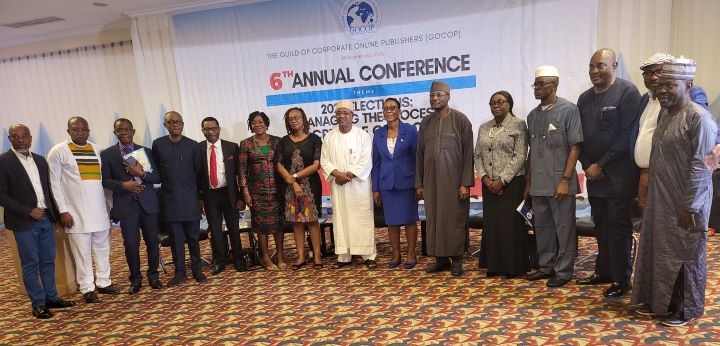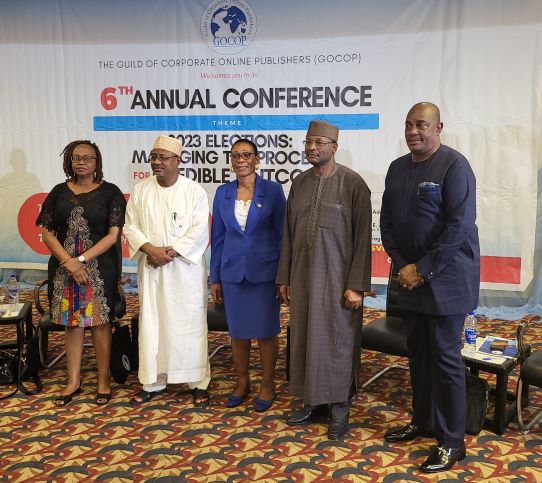Dipo Kehinde/
Fresh insights were provided on what could make the 2023 Elections credible, as thought leaders and the Chairman of the Independent National Electoral Commission (INEC), Prof. Mahmood Yakubu featured at the 6th Annual Conference of the Guild of Corporate Online Publishers (GOCOP) at the Sheraton Hotel, in Lagos, today.
In his keynote address titled ‘2023 Elections: Managing the Process for Credible Outcome’, Prof. Mahmood harped on innovations that would make a difference in the upcoming elections, ensure the credibility of the process, and restore public confidence.
Restating INEC’s commitment to credible elections, he said, “Votes will continue to count and will be the sole determinant of the electoral outcome. For this reason, the Commission has introduced many new innovations, supported by the deployment of appropriate technology, to protect the sanctity of the choice made by Nigerians at the polls ranging from voter registration to voter accreditation and result management. The deployment of the Bimodal Voter Accreditation System (BVAS) with its dual fingerprint and facial biometric accreditation process has ensured that only genuine voters are accredited to vote during elections. This has curtailed the incidence of multiple voting and other sharp practices associated with voter accreditation during elections. The BVAS has come to stay and will be the only means by which voters will be accredited in the 2023 General Election.
“Furthermore, the introduction of the INEC Result Viewing (IReV) Portal has made the result management procedure more transparent. Polling Unit results are now uploaded in real-time to the IReV portal for public view. This has enhanced transparency, credibility, and consequently public confidence in the outcome of elections. The IReV has come to stay, and polling unit results will be uploaded to the portal in real-time in the 2023 General Election.”
He said that improvement in the electoral process has led to less litigation, adding, “What we are seeing now is less and less litigation challenging the outcome of elections conducted by INEC. But we have more and more litigation on the conduct of party primaries.
Chairman at the occasion, the Founder of the Centre for Alternative Policy Perspectives and Strategy (CAPPS), Dr. Umar Ardo celebrated INEC’s achievements with the employment of Technology which, according to him included the elimination of multiple voting, vote allocation, changing of results, and irregular voting.
Expressing confidence in INEC and the Media, Dr. Ardo said, “INEC is an Island of efficiency in a huge ocean of inefficiency. What is left is now with the politicians, the politicians must behave themselves and accept that in an election there must be a winner and a loser.”
One of the panelists, former Inspector-General of Police, Dr. Solomon Arase spoke on election security management and identified challenges ahead of INEC as manpower deployment, capacity to dominate the security space, the institutional synergy of the Media, Civil Society, security agents, and electoral body, proper handling of communication by security agents, punishments for electoral offenses, and the issue of command and control among security agents.
He said that people committed electoral offenses without the precedence of how they could be dealt with, insisting that there must be a capacity to deal with those who commit electoral offenses.
Prof. Mahmood reacted by saying that the Constitution saddles INEC with duties and responsibilities that it cannot perform, such as arrest and prosecution of those who commit electoral offenses.

Another panelist, Dr. Chichi Aniagolu-Okoye of the Ford Foundation applauded INEC for what she described as the courage to pass the electoral bill. She described it as a quantum leap.
On the 2023 elections, Dr. Aniagolu-Okoye said, “Our concern must be how do we make sure that we have the leadership that will take us to the next level.”
She added that presently we are at the bottom of where we should be.
Analyzing the challenges in election security management with remarkable insights, Dr. Arase categorized the role of the police into three: The pre-election, the election day proper, and the post-election. He pointed out areas of conflict in the Public Order act and the electoral act.
He said, “In the pre-election activities if you go to Section 91: 1 – 4 of the electoral act, it’s well stated that the Commissioner of Police shall be directed to ensure that all rallies and processions by political parties are monitored. Now that there is public order act, people don’t have to take permits to hold rallies or processions. How are you going to manage the political parties who may choose to hold rallies on the same day in the same vicinity?
“The Act has stated that on no account should the Commissioner of Police stop anyone from holding processions. It means you must have a commissioner who must be mentally mobile, who will be able to think out of the box. That’s one challenge that we are likely to face.”
Dr. Arase also told the audience that all political parties try to manipulate elections in areas where they have strength, but there is a crisis when they try to go into the terrain of other people.
In her welcome address, the President of GOCOP, Maureen Chigbo, called for increased collaboration with the GOCOP family of thorough professionals. She spoke of inbuilt mechanisms for self-regulation and discipline within the body.
Prof. Mahmood commended GOCOP for choosing “2023 Elections: Managing the Process for Credible Outcome” as the theme for this year’s conference.
He said, “This is most appropriate for several reasons. First, the 2023 General Election is fast approaching. It is now 141 days to Election Day. Polling Units will open at 8.30 am on Saturday 25th February 2023 for national elections, Presidential and National Assembly, and at the same time on Saturday 11th March 2023 for State elections, Governorship, and State Assembly. Secondly, campaigns in public by political parties officially commenced eight days ago on Wednesday 28th September 2022. Therefore, the tempo of political activities has increased as parties, candidates and their supporters commence campaigns, rallies, processions, and media advertisements to canvass the support of the electorate. Thirdly, the Commission has published the final list of 15,322 candidates for the General Election contesting for 1,491 seats, one Presidential, 28 Governorship, 109 Senatorial, 360 House of Representatives and 993 State Assembly constituencies.”
The INEC Chairman reminded political parties and candidates that only last week they signed the Peace Accord organized by the National Peace Committee (NPC) in which they committed themselves to a peaceful electioneering campaign. He urged them to be guided by the letter and spirit of the Accord.
He added, “For our part, the Commission will pay particular attention to the conduct of parties, candidates, and their supporters. As a regulator, the Commission will play its role to ensure compliance with the provision of the law as well as our guidelines and regulations. We will pay particular attention to a peaceful campaign devoid of abusive, intemperate, and slanderous language as well as the use of innuendoes or insinuations likely to provoke a counter-reaction resulting in the breach of the peace. Similarly, we will pay special attention to the observance of limits on party and candidate finance. I urge political parties and candidates to carefully study the provisions of the Electoral Act 2022 and familiarize themselves with their obligations as well as the penalties under the law.
“As you are aware, the election is a multi-stakeholder activity. As the Commission is doing its best to ensure a credible process, we also appeal to the media for a continuous partnership. Managing the electoral process for a credible outcome is the responsibility of all of us. As campaign activities get underway, the media will continue to play an important role. A lot of the activities will take place in the media of which the new media is a critical player. We must continue to work together against the spread of fake news, misinformation, and disinformation that seek to create or exacerbate tension or de-legitimize processes and outcomes.”
Prof. Mahmood also called on GOCOP to lead a network or alliance of stakeholders to curb fake news engineered by unpatriotic individuals.
“Fake news is a threat to national security and all hands must be on deck to check it. Managing this process requires in part, concerted efforts. We have noticed that your members have so far steered clear of fake news. We urge you to do more. GOCOP should come out strongly in the battle against fake news which is clearly a challenge to the electoral process going forward. We are happy to note that you have your peer review mechanism using your leaders to regularly remind every member of the need for credible journalism. This is highly commendable. We urge you to extend this beyond GOCOP to serve as a bulwark against the menace of fake news.”
0





